Strokes are a serious medical condition that can have devastating effects on a person’s health. They occur when the blood supply to the brain is interrupted or reduced, which can lead to brain damage or even death.
While strokes are typically associated with factors such as high blood pressure, smoking, or pre-existing medical conditions, there is a common belief that a sudden, forceful event like a sneeze can trigger a stroke. In this article, we will explore the connection between sneezing and strokes and examine the scientific evidence behind this claim.
Understanding Strokes
Before delving into the link between sneezing and strokes, it is important to understand what a stroke is and what causes it. There are two main types of strokes: ischemic strokes and hemorrhagic strokes.
Ischemic strokes occur when a blood clot blocks an artery, cutting off blood flow to the brain. Hemorrhagic strokes, on the other hand, occur when a blood vessel in the brain bursts and causes bleeding.
Major Stroke Risk Factors
Stroke risk factors have been extensively studied, and several known factors have been identified. These risk factors include high blood pressure, smoking, obesity, diabetes, high cholesterol levels, heart disease, and a family history of strokes.
Additionally, lifestyle choices such as a sedentary lifestyle, poor diet, and excessive alcohol consumption can also contribute to an increased risk of stroke.
The Myth Behind Sneezing and Strokes
There is a widespread belief that sneezing can trigger a stroke.
The idea behind this theory is that the sudden increase in intrathoracic pressure caused by a forceful sneeze can lead to the disruption of blood vessels in the brain, potentially causing a stroke. However, the scientific evidence supporting this claim is limited.
The Mechanics of Sneezing
When a person sneezes, the muscles involved in the process contract forcefully. This contraction leads to an increase in pressure within the chest cavity, which then creates a sudden and forceful expulsion of air through the nose and mouth.
Sneezing is a reflexive action that helps to remove irritants from the nasal passages and prevent them from entering the respiratory system.
The Unlikely Link Between Sneezing and Strokes
While it is theoretically possible for the pressure generated during a sneeze to affect blood vessels in the brain, the likelihood of it leading to a stroke is extremely low.
The human body has several defense mechanisms in place to protect blood vessels from sudden changes in pressure. The blood vessels in the brain, in particular, are highly adapted and able to withstand fluctuations in pressure.
Scientific Evidence and Research
Several studies have been conducted to investigate the relationship between sneezing and strokes. One study published in the journal Stroke examined 1,300 patients who had experienced a stroke.
The study found that only 2% of the stroke cases were associated with air travel, a condition that can potentially involve sudden pressure changes similar to sneezing. This suggests that the risk of stroke triggered by pressure changes is minimal.
Another study published in the New England Journal of Medicine analyzed more than 1,000 people with acute stroke symptoms. The researchers found that no cases of strokes were directly triggered by sneezing or other sudden, forceful activities.
This further supports the notion that the risk of stroke due to sneezing is extremely low or non-existent.
Conclusion
Based on the current scientific evidence, it is highly unlikely that a sneeze can trigger a stroke.
While sneezing is a powerful reflexive action that creates a temporary increase in intrathoracic pressure, the body’s natural defense mechanisms protect the brain’s blood vessels from being affected. Strokes are more commonly caused by well-established risk factors such as high blood pressure, smoking, and pre-existing medical conditions.





























